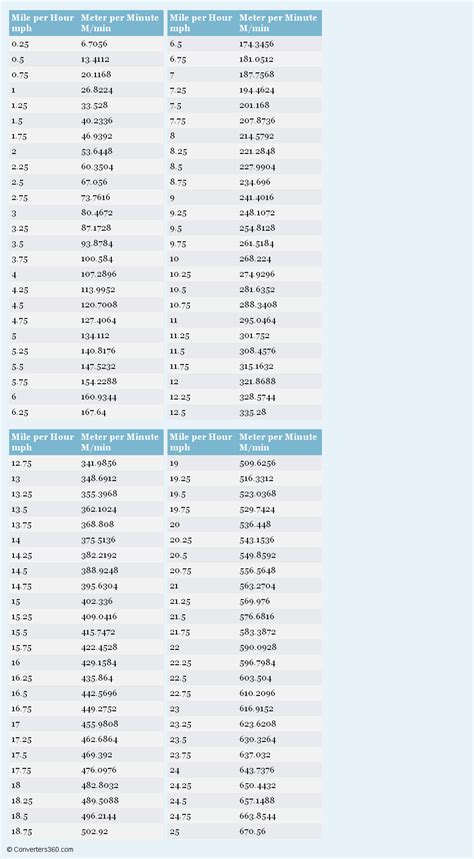Miles Per Hour To Meters Per Minute
listenit
Apr 02, 2025 · 4 min read

Table of Contents
Miles Per Hour to Meters Per Minute: A Comprehensive Guide
Converting units is a fundamental skill in various fields, from physics and engineering to everyday life. Understanding how to convert units allows for seamless communication and accurate calculations across different systems of measurement. This comprehensive guide delves into the conversion of miles per hour (mph) to meters per minute (m/min), providing a detailed explanation of the process, its applications, and practical examples.
Understanding the Units Involved
Before diving into the conversion process, let's clarify the units involved:
-
Miles per hour (mph): This is a unit of speed in the imperial system. It represents the distance traveled in miles during one hour.
-
Meters per minute (m/min): This is a unit of speed in the metric system. It represents the distance traveled in meters during one minute.
The conversion requires understanding the relationships between miles and meters, and hours and minutes.
Key Conversion Factors:
- Miles to Meters: 1 mile ≈ 1609.34 meters
- Hours to Minutes: 1 hour = 60 minutes
The Conversion Process: Miles Per Hour to Meters Per Minute
The conversion from mph to m/min involves a two-step process:
-
Convert miles to meters: Multiply the speed in mph by the conversion factor (1609.34 meters/mile).
-
Convert hours to minutes: Divide the result from step 1 by the conversion factor (60 minutes/hour).
This can be expressed mathematically as:
m/min = mph * (1609.34 meters/mile) / (60 minutes/hour)
This formula combines both conversion steps into a single equation. Let's break it down further with an example.
Example Conversion: Calculating Speed
Let's say a car is traveling at 60 mph. To convert this to meters per minute, we follow these steps:
Step 1: Convert miles to meters:
60 mph * 1609.34 meters/mile = 96560.4 meters/hour
Step 2: Convert hours to minutes:
96560.4 meters/hour / 60 minutes/hour = 1609.34 meters/minute
Therefore, a speed of 60 mph is equivalent to approximately 1609.34 meters per minute.
Simplifying the Conversion Formula
For quicker calculations, we can simplify the conversion formula:
m/min = mph * 26.8223
This simplified formula directly converts mph to m/min by combining the conversion factors: (1609.34/60 ≈ 26.8223). This approximation is suitable for most practical applications.
Using this simplified formula for our example:
60 mph * 26.8223 ≈ 1609.34 m/min
This confirms our previous calculation.
Applications of the Conversion
Converting between mph and m/min has numerous applications across various disciplines:
-
Physics and Engineering: Consistent units are crucial for accurate calculations in physics and engineering problems involving speed, velocity, and acceleration. Converting between different unit systems ensures compatibility and simplifies calculations.
-
Transportation: In transportation planning and analysis, converting between mph and m/min can be crucial for comparing speeds across different countries and regions that use different unit systems. This is particularly useful when designing transportation infrastructure or analyzing traffic flow.
-
Sports Analytics: In sports, particularly those involving speed and distance, converting between mph and m/min can be beneficial for analyzing athlete performance, comparing speeds across different sports, and developing training programs. For instance, analyzing the speed of a runner or cyclist.
-
Environmental Science: In environmental studies, understanding speed is vital when assessing phenomena like wind speeds, water currents, or the movement of pollutants. Converting speeds to a consistent unit allows for easier comparison and analysis.
Dealing with More Complex Scenarios
While the basic conversion is straightforward, some scenarios might require additional steps:
-
Converting from m/min to mph: The reverse conversion simply involves reversing the formula: mph = m/min / 26.8223
-
Converting speeds with decimals: The process remains the same, regardless of whether the speed involves decimal values. Simply plug the decimal value into the formula and perform the calculation.
-
Units other than mph and m/min: If dealing with different units of speed (e.g., kilometers per hour, feet per second), you will need to incorporate additional conversion factors accordingly. You will need to convert all units to a base unit (like meters and seconds) before performing the final conversion.
Practical Tips and Considerations
-
Use a calculator: For accurate conversions, it's recommended to use a calculator, especially when dealing with complex calculations or decimal values.
-
Round to significant figures: Be mindful of significant figures when rounding your final answer. This maintains the accuracy and precision of your results.
-
Double-check your work: Always double-check your calculations to ensure accuracy and avoid errors.
Conclusion
Converting miles per hour to meters per minute is a fundamental unit conversion with widespread applications. By understanding the process, the simplified formula, and potential scenarios, you can confidently perform this conversion across various fields and applications. The ability to smoothly convert between different unit systems is a valuable skill that enhances problem-solving capabilities and promotes clear communication in scientific and everyday contexts. Remember to always double-check your work and utilize tools like calculators to enhance the accuracy of your calculations. This comprehensive guide has equipped you with the necessary knowledge to confidently tackle these conversions.
Latest Posts
Latest Posts
-
Compute And Interpret The Mean Of The Random Variable X
Apr 03, 2025
-
Where Does Carbon Dioxide Enter A Plant
Apr 03, 2025
-
Does The Period Come Before Or After The Quote
Apr 03, 2025
-
How Are Elements Arranged In The Modern Periodic Table
Apr 03, 2025
-
How To Integrate On A Ti 84
Apr 03, 2025
Related Post
Thank you for visiting our website which covers about Miles Per Hour To Meters Per Minute . We hope the information provided has been useful to you. Feel free to contact us if you have any questions or need further assistance. See you next time and don't miss to bookmark.
